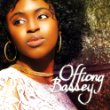People often complain about the lack of diversity in the music that they hear. Those artists who find commercial success while crafting a unique voice will draw imitators. Music, like most businesses, is a copycat enterprise. It’s also an industry that often punishes difference. Therefore, artists face strong pressures to make their music sound like what’s hot.
An artist such as Nigerian-American Offiong Bassey will challenge the expectations of American gospel music fans. It’s not like listeners in the American gospel market possess no familiarity with artists who infuse their music with the sounds of Africa. Israel Houghton recorded an album in South Africa and Jonathan Butler hails from the continent. Still, Bassey’s self-titled album pulses with the percussive rhythms of the Motherland. Bassey performs tracks such as “Edidem” in her native tongue of Efik. Performers from many genres employ djembe drums and use the African dialects in their songs. While these qualities might make listeners play closer attention to Offiong Bassey, neither factor explains the project’s unique sound.
Bassey’s lyrical and topical choices are the two things that give listeners insight into the fresh way in which this singer views the world, her relationship with humanity and with the Almighty. On “Legitimate Child” Bassey refers to a term that had been used to describe a child born to unmarried parents – the discredited and anachronistic phrase illegitimate child. “Legitimate Child” finds Bassey encouraging children whose legitimacy and humanity are questioned for a variety of reasons. We live in a materialistic world where possessions confer legitimacy, and it’s easy for a child who can’t afford designer clothes or consumer electronics to wonder about their humanity regardless of the marital status of their parents.
The breezy “Chasing the Wind” finds Bassey using the ubiquitous and invisible wind as a metaphor for our misplaced priorities. Those priorities often shift from goal to goal as if pushed by the wind. We pursue material gain and social status despite the fleeting nature of those goals. At the same time we ignore spiritual growth. “Wind slips through my finger/money doesn’t always linger/clothes get lost/and food will rot." Bassey sings about the material things that we spend so much time worrying about.
Many of the tracks on Offiong Bassey have a deeper meaning than the obvious issue the vocalist addresses. That is the case with “Wild Oats,” which on one level is a call for sexual morality and responsibility. However, cut also serves as a call to abstain from all types of irresponsible behavior ranging from material greed to polluting the environment.
On "Weatherman," Bassey transforms the oft-heard complaint that about meteorological accuracy into an admonishment not to put too much faith into human technology. She mixes sung vocals with spoken word and rap on this track. Her flow opens the track as she tells a story about listening to a weather report forecasting rain. She grabs her coat and hat only to go outside to sunny skies. “What’s forecast might not necessarily happen/Don’t you judge by the clouds in the sky/The environment can change with the blink of an eye/Some things the weatherman is never going to know.”
Plenty of gospel artists flip the script on traditional sounding gospel by employing R&B, hip-hop and rock to spread the word of God. On Offiong Bassey the artist goes a step further, employing not only unusual arrangements but also metaphorical creativity in the topics and situations addressed on this 12 track CD. Bassey’s spiritual insight is both novel and welcome. Recommended
By Howard Dukes

